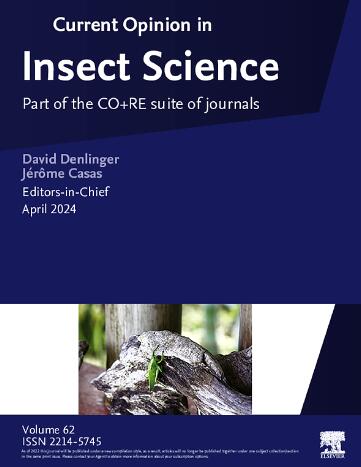昆虫攻击的神经内分泌控制:环境压力源是否调节攻击行为?
IF 4.8
1区 农林科学
Q1 BIOLOGY
引用次数: 0
摘要
在整个动物王国,攻击性行为对生存和繁殖的成功至关重要,使个体能够获得资源并抵御天敌。攻击行为也是高度可塑的,动物会根据环境和社会背景迅速调整攻击水平。神经内分泌系统控制着这种调节。虽然攻击的神经内分泌机制已经在脊椎动物中得到了广泛的研究,但它们在昆虫中的研究仍然不足。分析技术的最新进展为更精确地研究这些机制提供了新的机会。这项研究尤其及时,因为昆虫面临越来越多的环境压力,包括人为因素,这些压力会破坏它们的神经内分泌系统。本文综述了激素(幼激素、外皮甾体)和生物胺(多巴胺、酪胺、章鱼胺、血清素)在昆虫攻击调节中的作用,并重点介绍了近年来的研究进展。我们进一步讨论了环境压力因素如何影响神经内分泌通路,以及由此产生的对侵略、种群稳定性和生态系统服务的影响。本文章由计算机程序翻译,如有差异,请以英文原文为准。
Neuroendocrine control of insect aggression: do environmental stressors modulate aggressive behavior?
Aggressive behavior is crucial for survival and reproductive success across the animal kingdom, enabling individuals to secure resources and protect against natural enemies. Aggressive behavior is also highly plastic, with animals quickly adjusting their aggression level in response to environmental and social context. Neuroendocrine systems govern this regulation. While the neuroendocrine mechanisms of aggression have been extensively studied in vertebrates, they remain underexplored in insects. Recent advances in analytical techniques have provided new opportunities to investigate these mechanisms with greater precision. This research is particularly timely as insects face an increasing number of environmental stressors, including anthropogenic factors, which disrupt their neuroendocrine systems. This review aims to highlight the roles of hormones (juvenile hormone, ecdysteroids) and biogenic amines (dopamine, tyramine, octopamine, serotonin) in regulating insect aggression, emphasizing recent advances. We further discuss how environmental stressors impact neuroendocrine pathways and the resulting implications for aggression, population stability, and ecosystem services.
求助全文
通过发布文献求助,成功后即可免费获取论文全文。
去求助
来源期刊

Current opinion in insect science
BIOLOGYECOLOGYENTOMOLOGY-ECOLOGY
CiteScore
10.40
自引率
1.90%
发文量
113
期刊介绍:
Current Opinion in Insect Science is a new systematic review journal that aims to provide specialists with a unique and educational platform to keep up–to–date with the expanding volume of information published in the field of Insect Science. As this is such a broad discipline, we have determined themed sections each of which is reviewed once a year.
The following 11 areas are covered by Current Opinion in Insect Science.
-Ecology
-Insect genomics
-Global Change Biology
-Molecular Physiology (Including Immunity)
-Pests and Resistance
-Parasites, Parasitoids and Biological Control
-Behavioural Ecology
-Development and Regulation
-Social Insects
-Neuroscience
-Vectors and Medical and Veterinary Entomology
There is also a section that changes every year to reflect hot topics in the field.
Section Editors, who are major authorities in their area, are appointed by the Editors of the journal. They divide their section into a number of topics, ensuring that the field is comprehensively covered and that all issues of current importance are emphasized. Section Editors commission articles from leading scientists on each topic that they have selected and the commissioned authors write short review articles in which they present recent developments in their subject, emphasizing the aspects that, in their opinion, are most important. In addition, they provide short annotations to the papers that they consider to be most interesting from all those published in their topic over the previous year.
 求助内容:
求助内容: 应助结果提醒方式:
应助结果提醒方式:


